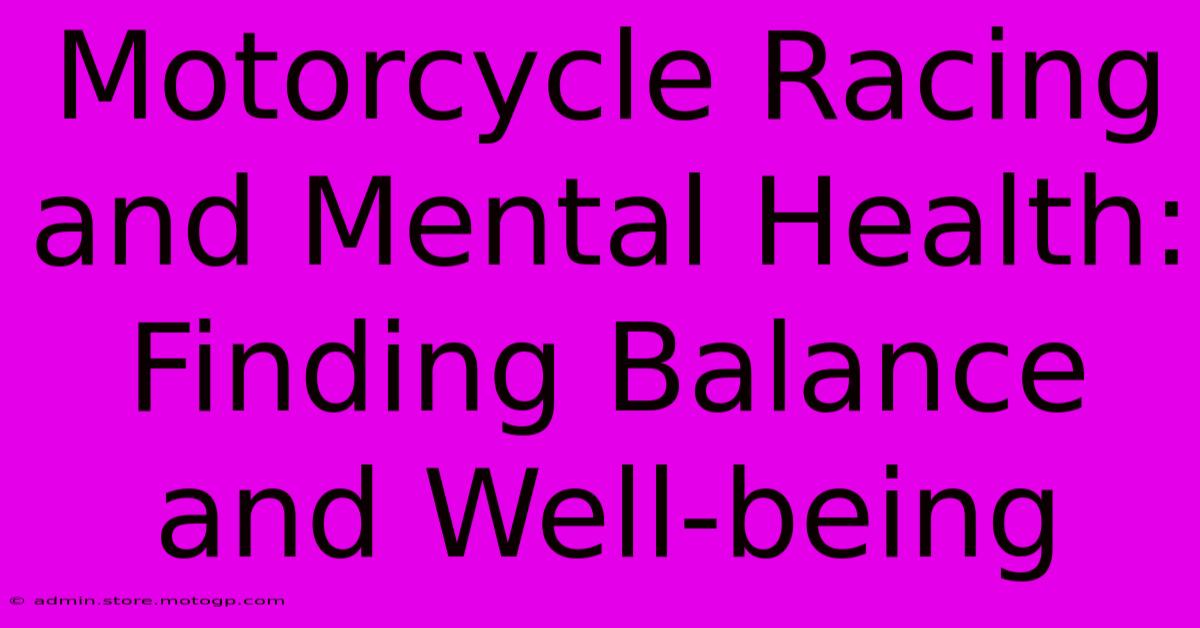Motorcycle Racing And Mental Health: Finding Balance And Well-being

Table of Contents
Motorcycle Racing and Mental Health: Finding Balance and Well-being
Motorcycle racing, a sport demanding precision, courage, and unwavering focus, often comes with an intense mental load. The high-stakes competition, pressure to perform, and constant risk of injury can significantly impact a racer's mental health. This article explores the unique challenges faced by motorcycle racers and provides insights into strategies for maintaining balance and well-being both on and off the track.
The Mental Demands of Motorcycle Racing
The world of professional motorcycle racing is a high-pressure environment. Racers face relentless competition, striving for milliseconds of advantage. This constant pressure can lead to:
- Stress and Anxiety: The fear of crashes, injuries, and underperformance is ever-present. The pressure to win, meet sponsor expectations, and maintain a competitive edge contributes significantly to stress and anxiety levels.
- Burnout: The demanding training schedule, constant travel, and intense competition can lead to burnout, characterized by emotional exhaustion, cynicism, and reduced professional efficacy.
- Depression: The intense pressure, potential for failure, and risk of injury can contribute to feelings of hopelessness and depression. Setbacks and injuries can exacerbate these feelings.
- Sleep Disturbances: The demanding schedule and anxiety often lead to difficulty sleeping, further impacting mental well-being and performance.
The Physical and Mental Connection
It's crucial to understand that physical and mental health are inextricably linked in motorcycle racing. Physical injuries can trigger emotional distress, while mental health issues can impact physical performance and recovery. A racer’s ability to manage stress and maintain a positive mindset is crucial for optimal performance and injury prevention.
Strategies for Maintaining Mental Well-being
Fortunately, racers can implement several strategies to prioritize their mental health and achieve a better balance:
1. Mindfulness and Meditation:
Practicing mindfulness and meditation techniques can help racers manage stress, improve focus, and enhance self-awareness. Regular meditation can calm the nervous system and promote a sense of inner peace, crucial for handling the pressures of racing.
2. Cognitive Behavioral Therapy (CBT):
CBT is a proven therapeutic approach that can help racers identify and challenge negative thought patterns and behaviors that contribute to anxiety and depression. A therapist can help develop coping mechanisms for handling stress and setbacks.
3. Physical Exercise and Recovery:
While training is crucial, incorporating activities outside of motorcycle riding, such as yoga, running, or strength training, can reduce stress, improve sleep, and boost overall well-being. Prioritizing proper rest and recovery is equally important for both physical and mental health.
4. Building a Strong Support System:
Having a strong support network of family, friends, coaches, and teammates is vital. Open communication and sharing experiences can provide comfort, perspective, and emotional support during challenging times.
5. Setting Realistic Goals and Expectations:
While striving for excellence is essential, setting realistic goals and expectations can help manage pressure and prevent burnout. Celebrating small victories and learning from setbacks fosters resilience and a healthy perspective.
6. Seeking Professional Help:
Don't hesitate to seek professional help from a psychologist or psychiatrist if you're struggling with mental health challenges. Early intervention is crucial for effective treatment and recovery.
The Importance of Open Communication
Openly discussing mental health within the racing community is vital. Breaking down the stigma surrounding mental health issues allows racers to seek help without fear of judgment. Teams and organizations should foster supportive environments where racers feel comfortable discussing their mental well-being.
Conclusion: Finding the Balance
Motorcycle racing demands immense physical and mental strength. By prioritizing mental well-being through mindfulness, therapy, exercise, and strong support systems, racers can achieve a healthy balance, enhancing their performance and overall quality of life both on and off the track. Remember, seeking help is a sign of strength, not weakness. Prioritizing mental health is an investment in a longer, healthier, and more successful racing career.

Thank you for visiting our website wich cover about Motorcycle Racing And Mental Health: Finding Balance And Well-being. We hope the information provided has been useful to you. Feel free to contact us if you have any questions or need further assistance. See you next time and dont miss to bookmark.
Featured Posts
-
Formula 1 Austin Map Your Guide To A Thrilling Race Weekend
Feb 18, 2025
-
F1 Austin The Indispensable Tv Schedule For Fans
Feb 18, 2025
-
Feel The Rush Captivating Moto Gp Pictures
Feb 18, 2025
-
F1 Ratings Whos Overrated Whos Underrated
Feb 18, 2025
-
Unforgettable Thrills Cota Circuit Days
Feb 18, 2025
